- Home
- Nnedi Okorafor
The Book of Phoenix Page 17
The Book of Phoenix Read online
Page 17
“All things are a part of The Whole,” he said. “All things can heal. All things have a spirit. Everything is powerful, Phoenix Okore. But the towers are violating all that is natural, they are endangering life on earth in its totality—animal, plant, soil, sand, iron, stone, and sky. You three are correct, something must be done; the others need to be freed. You know this instinctively. Even when you freed me in Tower 7, so unsure of what you were or your destiny.”
“What’s my destiny?”
He laughed.
“What’s yours then?” I asked. “Why were you in that glass prison?”
“You don’t ask the right questions,” he said, growing serious.
I gasped, suddenly understanding. “You let them capture you,” I said. I tried to think of a better question but nothing came. My mind was too full of wind.
“Fly,” he said, looking at me. He looked toward the downtown of the city. “I must go.”
Before I could say more, he was gone. I wanted to ask him who he was, where he came from, what he was. I wanted to ask him why he’d allowed them to catch and “crucify” him. How long had he been there? And how much did he know about me. What was he and what was I? He’d said I had to understand myself but . . . when I thought about it, well, what was I, really? How’d they make me? There were only three ways I could get these answers—from Seven, the Big Eye, or The Backbone. None of them would give me any answers. In the meantime, I wanted justice.
I rode three more powerful thermal columns. In the third one, I was joined by a large brown and white sea hawk. We flew together in silence for five minutes. It gave a few sharp whistles when it finally flew off. The gesture was so sweet that my heart ached. I had friends. I decided to return to my friends on the ground.
Saeed and Mmuo were leaning against the hood of Mmuo’s car rental. Saeed was eating from a bag of rust flakes and crushed glass, and Mmuo was peeling and eating a mango.
“What did you talk about?” Saeed asked me, shielding his eyes from the sun as he looked at me.
So Seven had been to meet them either before or after me. “He said I should call him Seven.”
Saeed and Mmuo laughed. “It doesn’t matter what you call him,” Saeed said. “No name will ever suit him.”
We had a plan. A good one. The first step was to get on the ship.
CHAPTER 15
Cruise Ship
They were calling my name.
We’d been too busy doing what terrorists do to realize it was all over the newsfeeds. How did they even know my name? “The Phoenix Okore burned our chains!” they shouted, waving what I recognized as the Ghanaian flag, their fists in the air. Some of those fists were flesh, some were metal and some were claws. I stared out the tiny window at the ocean, trying to ignore the broadcast Mmuo and Saeed were watching on the jelli telli stretched across the entire back wall of the small room. But how could I ignore revolution?
The speciMen who were calling themselves the “Ledussee” (“let us see”) must have hacked into the system of the Big Eye. Or . . . the footage Kofi recorded of me just before the Big Eye came to his house for us, it must have automatically uploaded to a page online. Yes. How else would they know to call me “okore”? Why else would they wave the Ghanaian flag? “I’m Phoenix Okore, and I am in Wulugu, Ghana,” I had said, looking into the eye of Kofi’s portable.
“This isn’t a bad thing,” Mmuo assured me. He grinned. “Phoenix, this is a movement. You started a movement.”
“No,” I said. “We did. You opened that elevator for me, didn’t you? Saeed, you tried to destroy that evil machine.” I narrowed my eyes, feeling my anger with him flare. A part of me was still upset at him, though I knew it wasn’t his fault. “You threw the ‘apple of knowledge’ at the devil’s machine.”
“Someone had to,” Saeed said, looking me in the eye. My fury didn’t bother him. “But they are not shouting our names, are they? Just yours.”
“What?!” Mmuo exclaimed. I turned around. He was staring at the jelli telli with his mouth agape. “But that can’t be!”
Now there was a well-dressed African anchorwoman on the screen speaking directly to us as she sat behind a desk. “ . . . just breaking, but the standoff between Nigerian soldiers and the Anansi Droids 419 has been going on for days. Sources say that these spider-like artificially intelligent robots, whose job is to protect the nation’s oil pipelines, are malfunctioning and the only person preventing a bloodbath is a woman named Eme. She is a local from the Niger Delta and she seems to have managed to befriend one of the droids. The local people here call the droids ‘zombies’ after the song ‘Zombie’ by afro-beat legend Fela Kuti, a song about corrupt government officials who do not think and only kill.
“All of Nigeria’s pipelines have been shut down by the droids and no human being is allowed near them. This standoff will affect the world. Expect fuel prices to increase. American President Chan will speak tonight on how the United States plans to help Nigeria with this crisis.”
Mmuo laughed ruefully. “When the roots of a tree decay, it spreads death to the branches. Trust me, this is happening elsewhere.”
Saeed called up the jelli telli’s virtual controls, when he shifted to search mode and they turned blue. “Most likely the speciMen have made it to Mexico or even managed to get on planes,” Saeed said. “The United States isn’t the only country producing us.”
“Anansi Droids will cross the ocean, ready to hate whatever human beings they find,” Mmuo added. He shook his head.
I turned from the jelli telli and smoothed out my dress. I looked at the open door into the night.
“You don’t have to do this,” Saeed said.
“Stop saying that. I know,” I snapped.
“You’ll really be all right?” Saeed asked.
“Of course. I’ll be flying.” I paused, anxious to get going. “ I can’t believe I’ve even set foot on this ship. It’s only for you two that I do. If you two were black Americans, you’d understand better.”
“But you could lose the ship,” he said. “What if there’s a storm and you get blown away?”
I laughed, turning back to him. He looked embarrassed, but still expected an answer. “I’ve crossed the ocean twice,” I said. “The second time, I followed the Big Eye’s ship. It was easy.”
“But this time, during the day, you can’t let them see you,” he said.
“I know. I’ll just fly very high.” I kissed him on the lips and forehead. “I’m going.”
Saeed only frowned.
“And food?” Mmuo asked, as I stepped toward the door that led outside to a service walkway on the side of the ship. “I know we’ve been over this, but you’re really ok without food?”
“I can go the whole three days without food,” I said. “My body will take care of it. But I’ll stop in every night, to see Saeed and eat.” The sun had gone down and the ship was setting off. I stepped out onto the narrow walkway on the side of the ship.
Can you hear me? Mmuo asked just as I took off.
“I hear you,” I said, flying into the night.
“Good,” he called after me from the walkway. I glanced back and saw that Saeed stood behind him. But it was too dark to see his face.
I flew with the stars and the early full moon, alone and away from everything and everyone, the ship a twinkling mass of lights below as it waded out to sea.
• • •
We’d driven hours from New York down to Port Carnival, a Florida cruise ship, cargo and naval port not far from Orlando. Mmuo’s congressman connection had come through for him a second time by procuring a ticket and false papers for Saeed on a Disney Cruise Ship leaving from Port Canaveral. Saeed effortlessly got through customs and onto the cruise ship with his suitcase carrying all of our things. Once onboard, a man wearing a white uniform with copper-colored skin and the jet-black hair of
a TV star had stepped forward and immediately escorted him to room 31 in the servant quarters. This man was named Andres.
Mmuo had to use other means to get to room 31, a room right next to a door that led outside to a narrow walkway linking to another part of the ship. First Mmuo dove and swam to this side of the ship and entered from its bottom. Once inside, he had to find room 31. He was naked; Mmuo could not pass through walls with clothes. All he had were the room number the congressman had given him, of the dining room, and his memory of the detailed 3D image of the ship. The plan went smoothly until he was onboard. He’d passed his hand through both Saeed and me giving us his nanomites; in this way we could hear him as he searched for us. He ran about, passing through wall after wall before he found our room.
My job was less complex. I waited until night and then flew around the ship until I saw the narrow walkway on the starboard side of the ship where Saeed stood waiting for me. The ship was over a thousand feet long, 125 feet wide and could carry 4000 passengers. My job wasn’t nearly as difficult as Mmuo’s, but finding a small walkway on such an enormous vehicle wasn’t easy, either. I flew back and forth several times, and there were people on deck and on the busier main walkways, as well. I had to stay out of sight.
The cruise ship would take three days to get to the Virgin Islands. I could have slipped or flown, but neither of those ways allowed me to travel with Mmuo and Saeed. It was too risky for anyone of us to take an airplane. There was a rebellion of speciMen cyborgs happening and they were calling my name. Saeed was considered dead. And both Mmuo and I were also all over the news for being spotted near the White House.
The whole country was on high alert for the “two escaped and dangerous African speciMen” and the Big Eye were scouring the nation for us. As far as we could tell, they had not figured out that we’d been in the library. Not yet. If I separated from Mmuo and Saeed now, we’d never find each other. So this was the best option, Saeed and Mmuo on the ship, me in the air. I finally had to set foot on an actual ship. Our plan was to destroy Tower 4; good enough reason.
CHAPTER 16
Limbo
The winged man would have understood how I felt. Seven was out there protecting and saving people like some New Mythology superhero. Where the new myths had villains like Penguin Men, Goblins, and Human Magnets, Seven had the Big Eye. To both of us, the taste of justice was sweet, metallic, and warm. However, up here, in the sky, above and away from everything, with no one but the sun and the spiraling columns of warm air during the day and the moon and whipping cool winds at night, it was easy to be that which was separate from anything alive. It was easy to be that which knew death, intimately. During the hours where I had to fly high above the ship to stay out of sight, I often had to work to keep the ship in sight—not because it was difficult to do, but because I’d become Other up there.
It was not silent. The air rushed past, below, above, into, and behind me constantly. It was noisy, harsh, and smelled like the ocean even up here. I spread my bright red wings wide, feeling with every one of my cells but at the same time blending with the air. Then the sun would set, and I would hear Mmuo in my head, “Phoenix, come back.” Familiar words to me that always managed to bring me back to myself, no matter where I was. And it was when I set foot on that ship, smelled the food cooking and chlorine from the ship’s many swimming pools, got a whiff of sewage from the ship’s plumbing, when I smelled the general smell that human beings give off when in a community, that I remembered the burning, rolling, vibrating ball of heat inside me.
• • •
I saw Saeed and Mmuo for about two hours in the evening. “We stay out of sight and help some of the workers when we can,” Saeed said. He shook his head. “They work these people too hard.”
Because he was good with machines, Mmuo worked with two men from Colombia in the engine room. Both of these men had been engineers in Colombia and couldn’t find work. Neither spoke English, but they knew exactly who Mmuo was and were delighted. “They are constantly grinning at me and shaking my hand,” Mmuo said. “One even brought a piece of paper and a pen for my autograph.”
Saeed said there was also a Yoruba worker on the ship named Omo who had taken a liking to Mmuo. So much so that Mmuo kept disappearing with her. “She’s not an engineer,” was all Saeed said. I never saw her, but I was glad for Mmuo. From what Saeed said and what Mmuo refused to discuss with me, Mmuo hadn’t been with a woman since he was imprisoned in Tower 7. That was seven years. I didn’t know much about men and knew even less about sex, but if I had to guess, this was a long time for a man.
Saeed volunteered to help wait tables at one of the restaurants near the swimming pool. He said several women made passes at him, even going so far as giving him their room keys.
“The women here behave worse than whores,” he muttered that second night as we ate in the small room. Today’s meal was roasted chicken, asparagus, some kind of salty rice, and a dessert of canned peaches. I found the meal disgusting and only nibbled at the rice. Mmuo turned on the jelli telli, and the next thing I saw was my face and the words “Phoenix Rising” in charred letters and “Ledussee the Future” just below it on the CNN channel. No anchorperson explaining, warning, or discussing. No ads scrolling by on the top, sides or bottom of the screen. Just my face and those words. A full minute passed, and my face and those words were still there.
“They’ve hacked CNN,” Mmuo said, grinning. He sat down on his bed, staring at the screen.
Saeed giggled and then glanced nervously at me.
I got up, my legs shaky. I glanced at the image one more time. The image of me looked intense and unsmiling; like I was staring right at the camera, at you. My bald head was shiny with sweat, and I was glowing. The image was from Tower 7, maybe right after I realized I could wipe my hair away. When had that image been captured? The Big Eye and their big eyes.
I sighed and ran my hand over my short hair, enjoying the feel of its roughness on my palm. “I will see you tomorrow night,” I muttered. Then I quickly threw open the door to our room, then to the outside, and I flew off. I had one more full night to fly alone before we’d arrive at the Virgin Islands. One more night in limbo.
• • •
The ship arrived at the Ann E. Abramson Pier that morning. And when the time came, Mmuo disrobed, sunk through the ship’s lower deck into the water and swam to a nearby quiet beach whose location we’d each intensively studied on the 3D map. He hid in a small cluster of palm trees and waited for Saeed to arrive with some clothes. I slipped and met him there a half-hour after he arrived. Saeed packed on the ship then got through customs using his passport. Once on land, he took a cab to the hotel near the beach and this is how he rejoined Mmuo and me.
But there is one more thing that I will speak of now, that I did not tell Saeed and certainly not Mmuo. I’d seen them just after the sun rose and only because the waters were so calm and the sky was so clear. The sunshine glinted off their shiny metal domes as they moved along. They had to be Anansi droids. They were about a mile from the cruise ship, moving in the opposite direction. I’d flown down for a closer look. There were at least fifteen of them, and they really did look like robot spiders! They were about the size of a small child. As I watched, several of them extended their long legs and spun over the surface of the water. Dare I say their movements were . . . playful? Some of them would drop beneath the water and come back up and spin some more. There were four that swam slowly a foot or two below the surface of the calm clear water, one on each side of the group, making a diamond formation.
I watched them for a while, wondering if they saw me, a bit afraid that they had developed the ability to fly, wondering where they were going, and wondering how much hatred they harbored for human beings. Then I flew back to the ship.
Human beings make terrible gods.
CHAPTER 17
Sandcastle on the Beach
In the US Vi
rgin Islands, they drove on the left hand side of the road though with American cars where the driver’s seat was on the left. I never knew something so minor would make such a big difference. I felt so off balance.
The air was wonderfully humid. I wanted to tear my burka to pieces and let the breeze caress my wings. Instead, I walked meekly behind Saeed as we left the hotel to catch another taxi. There was a taxi station down the road just as the congressman said there would be and the man in the white van named Lurrenz was waiting in the driver’s seat. Lurrenz turned out to be a Rasta with long bushy dreadlocks, an even bushier beard and green yellow and red wristbands on each wrist. He was chewing on a piece of coconut.
Lurrenz looked us over with wide almost scared eyes. “Good marnin’” he finally said, as he chewed. He pointed at Mmuo. “Are you Mmuo?”
“Yes,” he said, firmly shaking his hand. “Lurrenz?”
“Correct. Welcome,” he said. I’d expected his Caribbean accent to be stronger. He sounded as if he’d spent some time in the States. “Wow, cannot believe this.” He looked at us with what I can only call admiration. “Get in,” he said, looking around.
He scrambled out when he saw me slowly stepping up. “Let me help you,” he said, firmly taking my arm. It was a tight fit for me, though not as tight as with a car. When I sat down, with my closely pressed wings facing the window in the first row of seats, I nodded my head so he could see my thankfulness. “Thank you,” I said.
“You can take that off, if you like. The windows are tinted.” He slammed the door shut, and I cringed as the door pressed my wings more tightly to me.
I looked at Saeed and Mmuo, who both nodded. Then I threw the burka off, shifted to face the door, and stretched my wings as much as I could in the cramped car. They pushed at the ceiling and seat uncomfortably curling over, some pressing into the side of Saeed’s face. “Ahhhh,” I sighed, even half-stretching my wings was relief. Lurrenz was watching me in the rearview mirror.

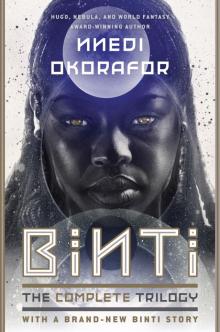 Binti, The Complete Trilogy: Binti ; Home ; The Night Masquerade
Binti, The Complete Trilogy: Binti ; Home ; The Night Masquerade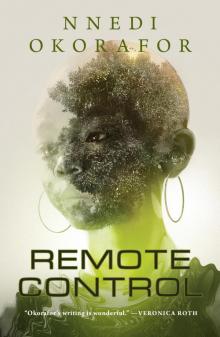 Remote Control
Remote Control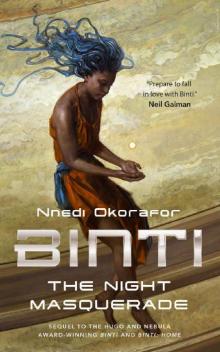 Binti: The Night Masquerade
Binti: The Night Masquerade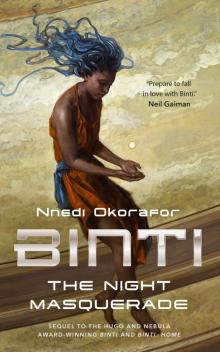 Binti--The Night Masquerade
Binti--The Night Masquerade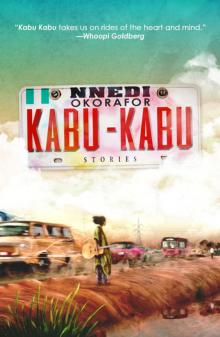 Kabu Kabu
Kabu Kabu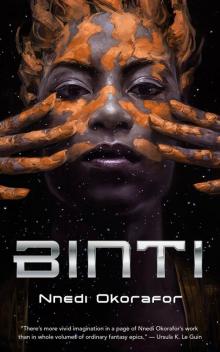 Binti
Binti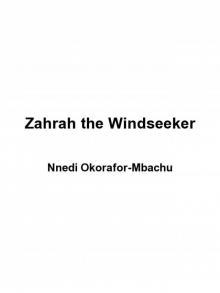 Zahrah the Windseeker
Zahrah the Windseeker Akata Witch: A Novel
Akata Witch: A Novel Ikenga
Ikenga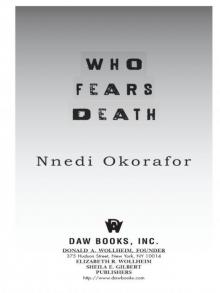 Who Fears Death
Who Fears Death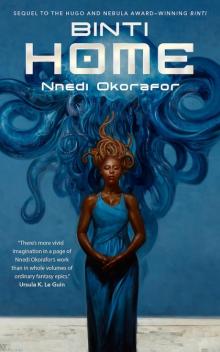 Binti--Home
Binti--Home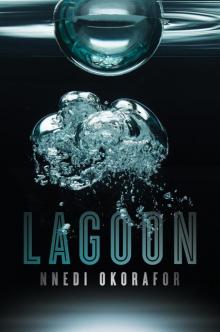 Lagoon
Lagoon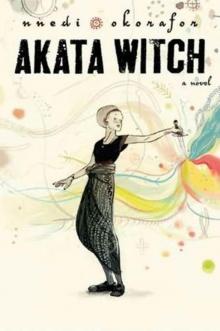 Akata Witch
Akata Witch The Book of Phoenix
The Book of Phoenix Akata Warrior
Akata Warrior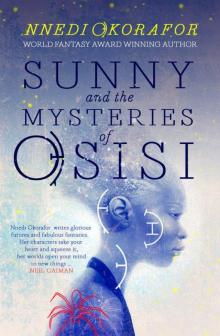 Sunny and the Mysteries of Osisi
Sunny and the Mysteries of Osisi